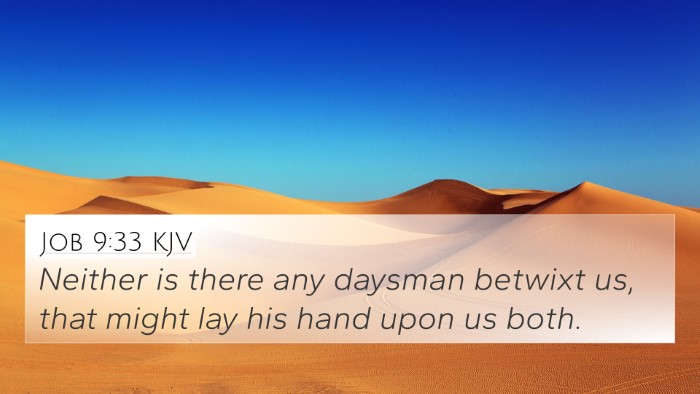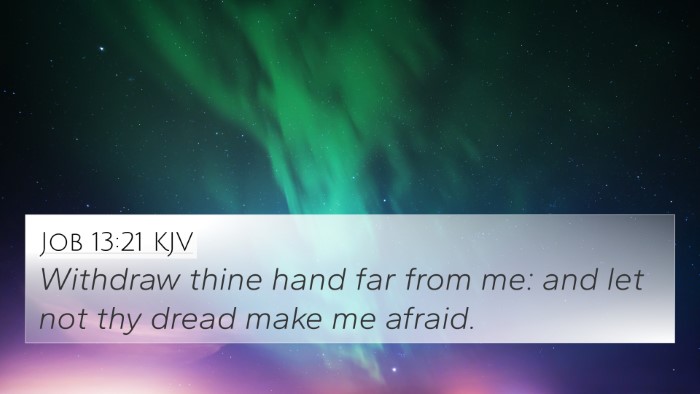Old Testament
Genesis Exodus Leviticus Numbers Deuteronomy Joshua Judges Ruth 1 Samuel 2 Samuel 1 Kings 2 Kings 1 Chronicles 2 Chronicles Ezra Nehemiah Esther Job Psalms Proverbs Ecclesiastes Song of Solomon Isaiah Jeremiah Lamentations Ezekiel Daniel Hosea Joel Amos Obadiah Jonah Micah Nahum Habakkuk Zephaniah Haggai Zechariah MalachiJob 23:6 Similar Verses
Job 23:6 Cross References
Will he plead against me with his great power? No; but he would put strength in me.
Uncover the Rich Themes and Topics of This Bible Verse
Listed below are the Bible themes associated with Job 23:6. We invite you to explore each theme to gain deeper insights into the Scriptures.
Job 23:6 Cross Reference Verses
This section features a detailed cross-reference designed to enrich your understanding of the Scriptures. Below, you will find carefully selected verses that echo the themes and teachings related to Job 23:6 KJV. Click on any image to explore detailed analyses of related Bible verses and uncover deeper theological insights.

Ezekiel 20:35 (KJV) »
And I will bring you into the wilderness of the people, and there will I plead with you face to face.
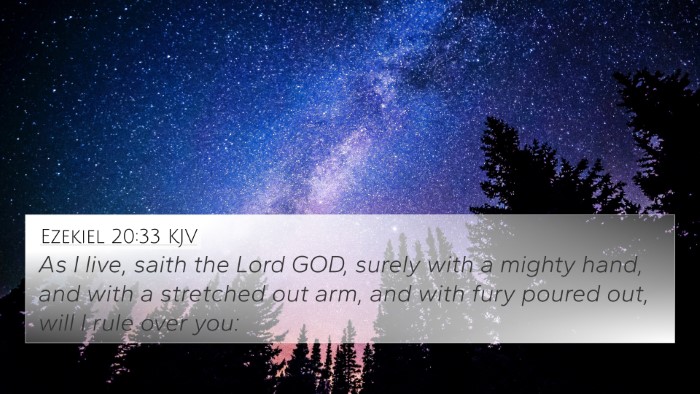
Ezekiel 20:33 (KJV) »
As I live, saith the Lord GOD, surely with a mighty hand, and with a stretched out arm, and with fury poured out, will I rule over you:

Isaiah 27:8 (KJV) »
In measure, when it shooteth forth, thou wilt debate with it: he stayeth his rough wind in the day of the east wind.

Isaiah 27:4 (KJV) »
Fury is not in me: who would set the briers and thorns against me in battle? I would go through them, I would burn them together.
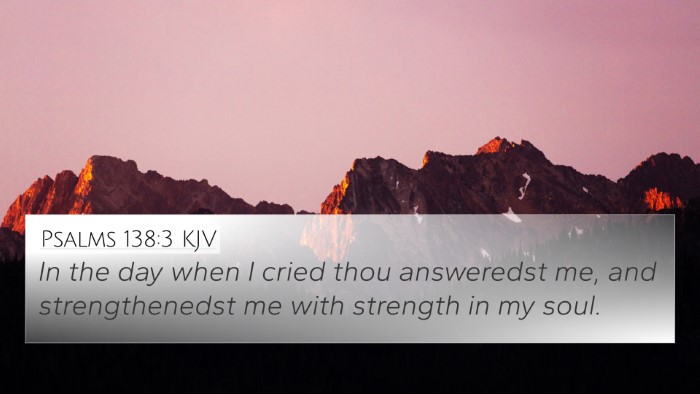
Psalms 138:3 (KJV) »
In the day when I cried thou answeredst me, and strengthenedst me with strength in my soul.
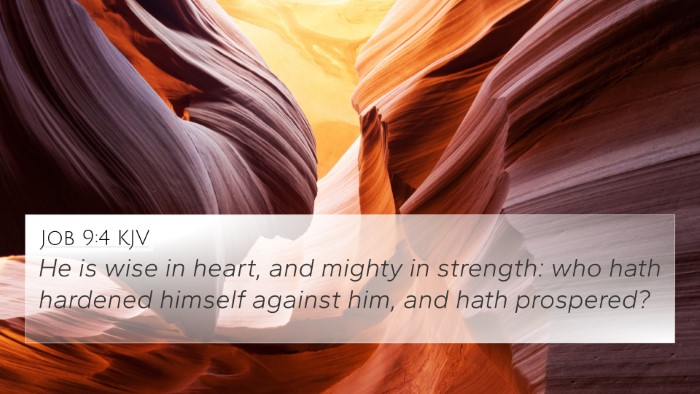
Job 9:4 (KJV) »
He is wise in heart, and mighty in strength: who hath hardened himself against him, and hath prospered?
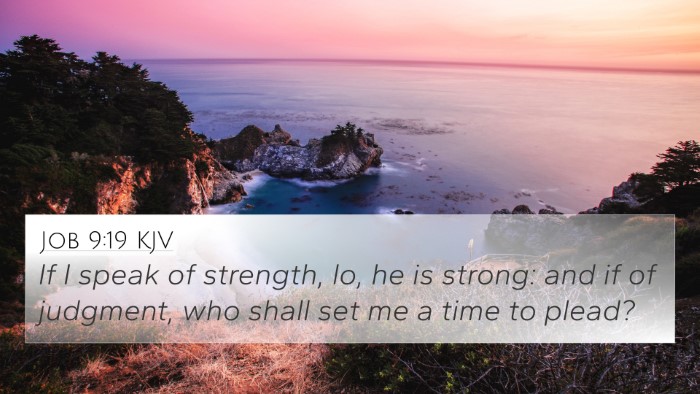
Job 9:19 (KJV) »
If I speak of strength, lo, he is strong: and if of judgment, who shall set me a time to plead?

2 Corinthians 12:9 (KJV) »
And he said unto me, My grace is sufficient for thee: for my strength is made perfect in weakness. Most gladly therefore will I rather glory in my infirmities, that the power of Christ may rest upon me.
Job 23:6 Verse Analysis and Similar Verses
Understanding Job 23:6
Job 23:6 states:
"Will He contend with me in the greatness of His power? No, surely He would pay attention to me."
Summary and Interpretation
This verse captures Job’s hope and yearning for an audience with God to present his case amid his suffering. Job questions whether God would engage with him based on His overwhelming power, hoping instead for a compassionate hearing.
Insights from Public Domain Commentaries
Matthew Henry's Commentary
Matthew Henry emphasizes Job's desire for a personal encounter with God. He points out that Job is not questioning God's justice but desires clarity and the ability to plead his case. Henry notes that Job perceives God as powerful, yet he hopes for a divine response that acknowledges his plight.
Albert Barnes' Commentary
Albert Barnes highlights the contrast between God’s power and Job’s human suffering. He illustrates Job’s argument by reflecting on the omnipotence of God, suggesting that Job believes God, while all-powerful, is also just and may listen to him. Barnes underlines the importance of knowing that God is aware of Job's afflictions.
Adam Clarke's Commentary
Adam Clarke offers a more existential view, focusing on the emotional turmoil Job experiences and his profound need for an answer. Clarke suggests that Job’s longing to reason with God is rooted in his faith, indicating that deep within his despair is a belief in God’s willingness to listen.
Cross-Referencing Biblical Texts
Job 23:6 connects with several other scriptures, enhancing our understanding of themes such as suffering, divine justice, and the human condition. Here are key cross-references:
- Psalm 10:1: "Why, O LORD, do you stand far off? Why do you hide yourself in times of trouble?" - Reflecting similar feelings of abandonment.
- Psalm 25:1-2: "To you, O LORD, I lift up my soul; in you I trust, O my God. Do not let me be put to shame." - A prayerful expression of trust amidst suffering.
- Isaiah 40:27: "Why do you complain, Jacob? Why do you say, Israel, 'My way is hidden from the LORD; my cause is disregarded by my God'?" - Echoing Job’s questioning of God’s awareness.
- Hebrews 4:16: "Let us then approach God’s throne of grace with confidence." - Encourages coming before God, similar to Job’s plea.
- Romans 8:31: "If God is for us, who can be against us?" - A declaration of God’s support amid accusations and trials.
- 1 Peter 5:7: "Cast all your anxiety on him because he cares for you." - Relates to the theme of discussing one’s burdens with God.
- Job 13:23-24: "How many wrongs and sins have I committed? Show me my offense and my sin. Why do you hide your face and consider me your enemy?" - Directly reflecting Job’s desire for accountability from God.
Thematic Bible Verse Connections
In studying Job 23:6, we find significant connections in the Bible that contribute to a deeper understanding of Job's struggles:
- Suffering and Divine Justice: Links with verses that discuss the nature of suffering and God’s justice, such as Job 1:22 and Revelation 21:4.
- The Search for God: Connects with verses urging believers to seek God in times of trouble, such as Jeremiah 29:13.
- Hope in Despair: Relates to verses offering hope, including Isaiah 40:31 and Lamentations 3:22-23.
Tools for Bible Cross-Referencing
Understanding how to find connections between Bible verses involves various tools:
- Bible Concordance: Lists words and phrases for locating verses related to specific topics.
- Bible Cross-Reference Guide: An organized resource for identifying related scriptures.
- Cross-Reference Bible Study: A methodical approach to studying interrelated scriptures for deeper insight.
Conclusion
Job 23:6 reveals a profound inquiry into the nature of suffering and God’s judicial characteristics. By utilizing cross-referencing tools and drawing connections between thematic verses, one can gain a richer contextual understanding not only of Job’s plight but also of God’s enduring relationship with humanity amid trials. The combined insights from Matthew Henry, Albert Barnes, and Adam Clarke deepen the interpretation of this significant biblical moment.



